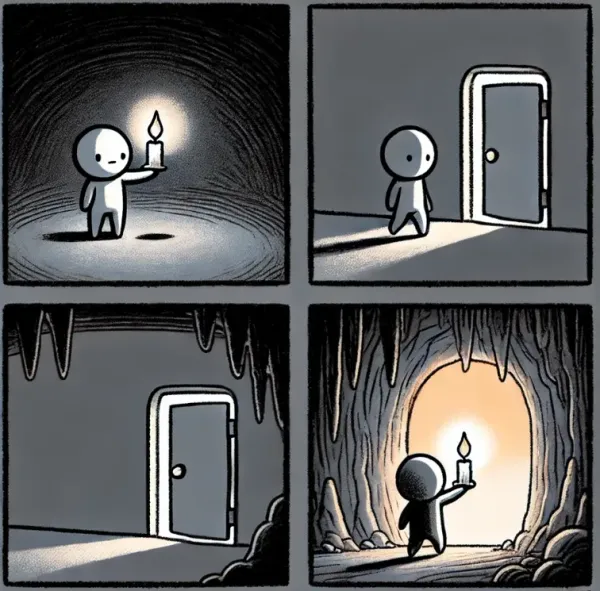"Accelerating Wisdom" Episode 6: Love, Parenting and Relationships
How do we improve the quality of attention we pay to those we love the most?


[8 minute read]
- Article #6 of 8 in the Accelerating Wisdom Series.
- Guest Expert: Allison Paradise. Allison is a neuroscientist and founder of The Epicenter. She is an expert in consciousness and relationships, specifically the role of intuition in raising mentally healthy children.
- Woo rating: 3/10 (all Leading Edge content will have a “woo rating” reflecting how far from the current consensus worldview it is. But we will never cover topics without direct practical applications).
One of the better definitions of wisdom I’ve heard is “the ability to pay attention to what you love, and ignore what you don’t.” Nowhere is this more important than our interpersonal relationships.
This episode’s expert Allison Paradise has a unique and differentiated understanding of this topic.

Love beyond the screen
“If you think you're enlightened, go spend a week with your family.”
- Ram Dass
The danger of spending your life thinking about abstract ideas is that they drive you further into your head and away from those you love. My wife constantly asks if my work is making me a better husband or father. It was with her in mind that I knew I needed to do an episode on relationships.
I have often regarded my wife and our two young children as a charming and occasionally irritating diversion from my “work.” I have now come to see them as the work. Turns out my spiritual practice isn’t wanting to achieve enlightenment, as much as it’s wanting to be truly present with my wife and kids.
Thanks to the work of outspoken tech critics like Jonathan Haidt and Tristan Harris, we are well aware that smartphones are damaging our children’s psyches and the quality of our own attention. We all know we need to put the phones down. But once we’ve locked them in the safe and stopped shaking, how do we consciously improve the quality of our interpersonal relationships?
Allison Paradise is a neuroscientist and an expert in consciousness, specifically the role of intuition in raising mentally healthy children. She’s one of the most special people I’ve ever been lucky enough to meet, and I am confident this comes out of this episode’s interview. Her insights are especially excellent for parents, but most of them apply to all of our interpersonal relationships (it’s 3/10 woo except for one offhand comment..). Spotify link here.
A core message of Allison’s work is that children are deeply intuitive beings. They pick up much more from their environment, and us, than we might want to accept. Horrifyingly, they intuitively detect the hypocritical discrepancies between what we tell them to do, and what we do ourselves. My older half-sister has four flourishing children in their late 20s and early 30s. Four out of four probably goes beyond luck. My wife and I asked her for the secret and she repied that the single most important thing is leading by example.
Allison also believes that children atend to know their own limits, powers and capabilities more than we give them credit for. A great deal of her work is helping kids discover, cultivate, trust or rediscover these inherent gifts. This means children need to learn how to trust themselves and their intuitions. She teaches them to decide when they’re hungry and thirsty. She lets them decide their own limits when playing (up to a point).
Children obviously also love it when adults play with them. But if you're able to engage in imaginative play, that’s even better.1 She says it’s “because now you're able to push their imagination and move storylines and push ideas of what could be true and what's possible. And that just really expands their minds into the space of the unknown.”
Perhaps the best piece of advice she’s given me is to share my emotional state with my son, even though he’s only five. The risk is that he thinks daddy’s terrible mood is being caused by him. So if I get an annoying email or I’m short-tempered because I’m hungry, I try my best to tell him why. He sometimes responds with unexpectedly deep insights into his own emotional experiences. It also helps normalise communicating emotional depth, which wasn’t a big part of my own childhood. She recommends asking your children questions about how they are feeling, where the answer can’t be “good.” This helps build their sense of emotional granularity.2
Something else she also recommends is a deep curiosity when speaking to kids. This has applications well beyond parenting. A common way that most people will listen is trying to free-associate. As she puts it:
A kid might tell you a story about a bird and you go, my gosh, I saw a bird once… They have no interest in this. And it sounds like you're not really listening because they have a story they want to tell you. So there's that form of listening and we do that a lot as adults; we listen for a keyword that that branches off into something else. And then we free associate with that. And we're never really connecting, we’re sort of talking past each other… And then there's the sort of listening where you you're awash in it. It's hard to put in words, it just sort of it flows over you. And when you respond, it's effortless. You're not free associating, you're directly engaged with what is being said to you. And that form of attention is very pure. It's very potent. And if you can do that and be fully engaged, it's actually fascinating. It's not boring because you're flowing with somebody in this beautiful creative space where you start to co-create the conversation, letting the kids guide it.
I find that space to be less exhausting than all the others and to be the most interesting. It takes a lot of work though, you have to be able to quiet your own thoughts and stop all the free associations. And that takes some practice. So to do that, I would suggest doing focusing exercises to be able to really be present with somebody.
When it comes to the dreaded phones, Allison recommends telling your kids why you’re switching your attention away from them. “Daddy needs to answer an email.” It makes it clearer to them, and makes you more conscious about how often you’re doing it.
Five practical tips for wise parenting:
Allison closed our interview with five tips.
- To focus, to spend time learning how to focus, and use that then in all parts of your life.3
- To know yourself as a creative being, to understand that you create the environment that you're in and that your child is in and that kids are really subject to the environment that you create. So the things that they experience are direct results of the environment that you're creating. This is not to put too much pressure on, it's just simply what it is. So the more aware you can be of the environment that you're creating, the feeling of that environment, the more you'll be able to understand how your kids are responding and better understand their behavior.
- Be able to talk to, really talk to, your children, understand them as equals in a lot of ways. As intuitive beings, they probably see things and know things that you don't yet see or know. But also not to rely on them as the seers of the family or as the intuitives in the family. I see people do that also. That's very unfair. To recognize that they know things for themselves and to trust them in their knowing, to respect their autonomy as beings.
- And also you can understand that, if none of this is something you want to do, that's okay too. This is not a space of “thou shalt.” This is a “here's something that we've tried and it's worked really well. If you want to try it, great. And if you don't want to try it, that's great too.” There's a lot of pressure put on parents and put on kids. And we experience so many of the kids that we work with as having very high levels of anxiety, very high levels of depression. When you're around them, there’s this feeling of dysregulated vibration. And just understanding that that's coming from the world. It's not necessarily just coming from you. And the more that we can all recognize and be aware of this and be present with them and say, yeah, we see that, we feel that. Just the more they can breathe a sigh of, okay, I'm not alone in this.
- And maybe the last thing is remember play and art. Art is a really powerful tool to help us process what we're experiencing. And so is play. And you were a kid once. So enjoy them. They're fun. You know, kids are really fun. I spend all day playing. It's kind of fabulous. And if you can remember some of those things, hopefully that'll help a bit and make the process of raising them and the responsibility of raising them be a little bit more enjoyable than it probably already is. Because they are such fun, amazing people.
I really like Neale Donald Walsch’s framing of relationships, especially marriage and parenthood, not as obligations but as opportunities.4 They are a constant mirror, often an uncomfortable one, of places we can evolve and grow wiser. The attractor that guides us along the wisdom path seems to feels like love. The more we are able to give and receive love, the more wisely and joyfully we will be able to navigate life. So if your wisdom, spiritual maturity and power scales with love, your closest relationships offer the best opportunities for growth.
“Let me ask you something. If someone prays for patience, you think God gives them patience? Or does he give them the opportunity to be patient? If he prayed for courage, does God give him courage, or does he give him opportunities to be courageous? If someone prayed for their family to be closer, do you think God zaps them with warm fuzzy feelings, or does he give them opportunities to love each other?”
- God (Morgan Freeman), Evan Almighty (yes the source of the quote surprised me too)
Suggested Experiments and Commitments:
If you’re interested in taking the benefits of these concepts beyond the screen and into your own life, here is a recommended short-term experiment and longer-term commitment.
Experiment:
- Notice when you start to free-associate in your thoughts and during conversation. Gently move your attention back to the present moment.
- Take a photo of something unexpectedly beautiful each day. It forces you to focus in a unique way. Plus it can be a fun group activity.
Commitment:
- Put your phone in a different room for at least one hour every evening during family time, and sleep with it in another room.
Join us in a couple of weeks for Episode 7 on Dreams and Synchronicity with Dan Lawrence.
Thanks again to Allison Paradise!
[Allison works as an intuitive guide in private 1:1 sessions for people of all ages. For more information contact her at allison@be-the-epicenter.org]
Hit Subscribe to follow the rest of the series.
Footnotes + Additional Resources:
Subscribe to premium to see this section, read the interview transcript, access footnotes, related reading and also gain access to the Circle Members' Forum.
Apply here to become a member of the 150 person network (already close to capacity!) for private expert Q&A calls and the small private WhatsApp.
Transcript on Request.
1 Honestly, Bluey’s dad Bandit from the TV show Bluey might be one of the best examples of rich imaginative play I’ve ever seen.
2 Check out Episode 1 for a more detailed discussion on the benefits of this skill and practice.
3 Presence and focusing practices are a topic for a whole future episode.
4 A series of simply bizarre syncronicities led me to read Walsch’s book Conversations with God, which was very enjoyable.




